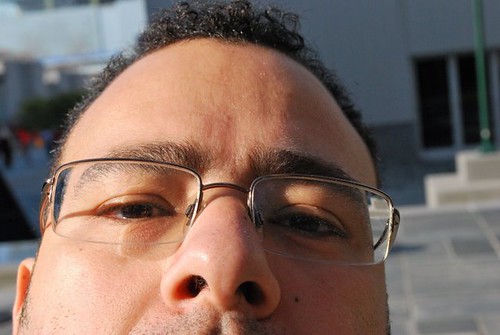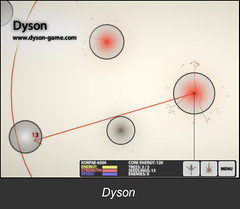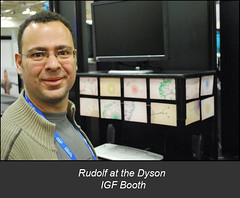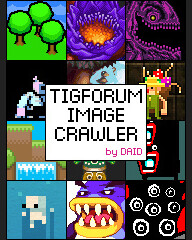Posts with ‘Dyson’ Tag
TIGInterview: Rudolf Kremers
By: Leigh Christian Ashton
On: April 18th, 2009

Following on from our recent interview with Alex May, I contacted his colleague and co-creator of Dyson, Rudolf Kremers to find out his opinions on Indie gaming, the IGF, feature creep and Astro Chickens.
Leigh: Rudolf, hello. For those who don’t know you, could you please introduce yourself and tell us a little bit about you?
Rudolf: My name is Rudolf Kremers; I was born in Spain, grew up in the Netherlands, and have been a UK resident for nearly ten years. For all that time I have worked in games, at big studios like EA and smaller ones like Curve, and have worked on anything from Harry Potter to Championship manager to Joystick games. Before that I have been making games as an amateur since the 80s, and indulged in most creative disciplines out there. Last year I decided I had enough of traditional development and started my own company ion order to create games independently.
Leigh: So your current project is the much loved Dyson, with Alex May, can you tell me a little bit about how it all came about?
 Rudolf: Well, Dyson was an entry to the TIGSource procedural generation competition. We made the first version of the game in 1 month, and got second place! \o/
Rudolf: Well, Dyson was an entry to the TIGSource procedural generation competition. We made the first version of the game in 1 month, and got second place! \o/
Everything worked out really well, we loved the way we worked together, the game was showing real promise, and we were onto something with the procedural elements and the minimalist design, so we have been developing it since. First a much bigger and better version for the IGF, on the basis of which we were nominated for a number of awards, and since then we are working on a full commercial version.
Leigh: Alex is the programmer on Dyson; can you offer some insight into your input on the project?
Rudolf: I am the designer (although we both have input) and I take on additional tasks like level design and audio implementation and whatever else comes up really. Alex and myself work together in a very natural and complementary fashion. We just do what is most appropriate for the individual to do. We hardly discuss roles, we just take on jobs that we are most suited to. :)
Leigh: Dyson was a finalist in the Seumas McNally grand prize category at The Independent Gaming Festival held recently in San Francisco, you and Alex flew out to exhibit Dyson, what was the reaction from the floor like?
Rudolf: I was blown away by the enormous amount of positive feedback we received. It was really quite something. Two aspects stood out for 90% of the people that played the game.
1: They just love the visuals. Utterly. Alex did an incredible job there and people react to it with real passion.
2: The minimalist design. It seems people are really responding to the depth of gameplay that comes out of very minimalist design parameters.
If we have achieved anything it is combining these two aspects to create something that is worthwhile. Another interesting aspect of the IGF was that it was INCREDIBLY BUSY. I can’t believe how many people came by, players and industry veterans or indie developers of all sorts. It was tangible in the air that indie games have turned a corner and that a special wave of creativity is forming.
Leigh: And what were your impressions of the other Indie games on display?

Rudolf: There was an incredible dynamic feeling about the other games. The diversity and level of execution was very high. From thought provoking art games (Jason Rohrer’s Between) to The wonderful Blueberry garden, to the dreamlike “Feistâ€, to the Music game “Musaic Box†Big teams like “Xeno Clash†(Man that game looks interesting) to personal affairs like Edmund McMillen’s “Coil†(Should really be played in a more appropriate setting) or ambient games like Osmos and Dyson.
I am leaving out tons of other ones as well like some of the student games or mobile games. The basic point is that it was to me an uplifting experience to see such a wealth of great game experiences on offer. In addition the indie developers themselves were also fantastic, they were all very supportive and interesting people. They don’t see each other as competitors at all, but as kindred souls.
No wonder we all got on so well ;-)
Leigh: Did you attend any of the talks while at the IGF?
Rudolf: Yeah I went to nearly all IGS sessions. They were superb.
Leigh: was there anything in particular you enjoyed, learned from or agreed with?
Rudolf: Too much to mention, but some things stood out. Simon Carless did a great session about indie sales figures, which painted a very useful picture. As far as I am concerned it is now viable to aim for a career as an indie developer. Cactus gave a hilarious but also poignant session on how to make games in 4 hours, but what it was really about was how to have a mindset that allows on to make great games without being mired in traditions and conventions that in the end don’t really matter. Petri Purho gave an excellent session on his experience creating Crayon Physics Deluxe, and Phil Fish and Kyle Gabler gave a very talk about how to market use PR to get people to know about your game. The indie games rant was good, and there were plenty of other interesting sessions as well notably the “what you always wanted to know about going indie, but were afraid to ask†session by 2dboy.
Leigh: Indie games are really breaking into the general gaming conscious at the moment, Indie games are more than ever in a better position to profit from this, but as they do so, do you see them changing to meet business needs?
Rudolf: To be honest, not at all. All I can see is people adhering to whatever principles they have to make games. These principles can be fiercely artistic, or specifically commercial. Indie is no more and no less than a way of creating games independently from big studios and developers and so on, it does not necessarily dictate the actual content of the game.
Leigh: Do you see this as breaking with the spirit of Independent games?
Rudolf: far from it, I think we are in an incredibly interesting period of indie game development that is go into produce more and even better games for a while yet. This wave is still growing and the added financial possibilities so far work as an enabler rather then a stifler.
Leigh: Do you have an opinion on that?
Rudolf: One of the problems with corporate game development (and there are many problems) is that in many cases it has lost sight of the fact that we are supposed to give the player a worthwhile experience. This comes from many factors: ridiculously overblown game budgets necessitating mega hits which lead to me-too games where everybody tries to imitate the latest successful game, a layer of unaccountable middle management whose incentives are in conflict with many of those that would actually create worthwhile games, and incredible waste due to bad tools and processes. Then there is the weird way the industry treats developers. In corporate game development the actual game creators are pretty much forbidden to interact with their audience, and they are almost never in control of, or regain possession of the IP they develop or are working on. I mean, what on earth can anybody expect to come out of such an environment? There are some games that can only be created in a mega budget corporate environment, and I have no problem with that, bit many games that would benefit from a stronger sense of identity and originality are being forced to compete with those titles. And that is simply not viable. This is why so many mid sized developers have gone under. It has been a massacre really, and the industry has not replied to this crisis in a positive way. So this has provided a rather fertile soil for and independent movement to arrive.
Smaller indie teams don’t suffer from most of these constraints and as a result are making games that offer a viable alternative to so called AAA games. Many players are now realising how much worthwhile material is being produced and that in turn feeds back into the energy and motivation of indie teams.
Leigh: Going back to Dyson, can you talk a little about what influenced its setting and design?
Rudolf: Together with Alex’s input the game’s setting and design was also shaped by a whole bunch of disparate elements that come from my personal obsession with some subjects. To name a few in rapid succession: Freeman Dyson’s ideas like the “Dyson Tree†and “Astro Chickenâ€, Von Neumann’s work, Penrose’s plywood models demonstrating that it was possible to demonstrate aspects of artificial life in simple physical models, Philip k. Dick’s story about endlessly warring robots, some principles of (minimalist) game design I wanted to try out, sci-fi ideas, and more.
(I must admit, I am a proper geek about this stuff)
I talk some more about this stuff on our blog.
Leigh: Has the decision to go commercial impacted the design of Dyson?
Rudolf: Has to a degree, for a moment we were afraid to recognise the basic strengths of the game and started to add features to it out of a fear of not having enough to give to players that will end up buying the game. We saw the fallacy of this however during GDC and are now back on track with finishing the game without adding stuff for spurious reasons. It has also helped however as we have committed to a date, and that made us realise that we could have gone on adding stuff to the game indefinitely, and that would actually not necessarily make for a better game.
Leigh: Was it difficult to keep the feature creep to a minimum?
Rudolf: It threatened to rear its head as I just described, but I think we recognised the danger in time and have dealt with it. It is extra important for us as one of the game’s main selling points is its minimalist approach.
Leigh: So when asked what’s next for you guys, Alex was pretty general and wouldn’t give any details away, can get you to break rank and give us a better idea? :)
Rudolf: Haha!! I can say that we will make more games together :) I also have some of my personal projects bubbling ion the background as well, some of which will eventually come to fruition too. I am leaving that topic untouched for now. I am also finishing a book about level design in the next month or so. Busy busy busy!
Leigh: Dyson is released in July on Direct2Drive and Steam, I’m excited, are you?
Rudolf: It is the culmination of a lifelong dream for me. My main professional/artistic goal in life is to be able to live off my creative output. If Dyson does well I would be over the moon.
Leigh: So I can have a review copy? :)
Rudolf: Yeah, you can pre-order the game if you like? AHAHAH.
Actually you can’t. (Well, I am sure you can get a review copy before release, it is up to you to decide if blatant nepotism is how you want to get ahead in life. Think of the children!!!!)
Leigh: Thanks for your time Rudolf, its been great hearing from you and I think I speak for us all when I say we can’t wait to see the final release of Dyson!
Rudolf: That is very kind of you. We are definitely doing out best to make the game as good as it can be.

